Amputation Injury Lawyers
Amputation injuries can change your life forever. If your amputation was because of someone else’s negligence, you have the right to try and recover compensation for your medical bills, lost wages, and pain and suffering.
The BBGA Difference: How We Can Help
The personal injury lawyers at Blasingame, Burch, Garrard & Ashley, P.C. are experienced in successfully recovering compensation for victims of injuries that led to amputation. We understand the ongoing trauma and hardship victims face following an amputation and we work diligently to ensure victims receive the compensation they need to pay medical bills, afford ongoing treatment, and get on with life. If you or a loved one was personally injured because of someone else’s negligence and it resulted in an amputation, we can review the circumstances of your incident and determine whether you have a valid case. Contact us today for a free consultation. We can be reached at 706-354-4000 or you can fill out our contact form to tell us more about your potential case.
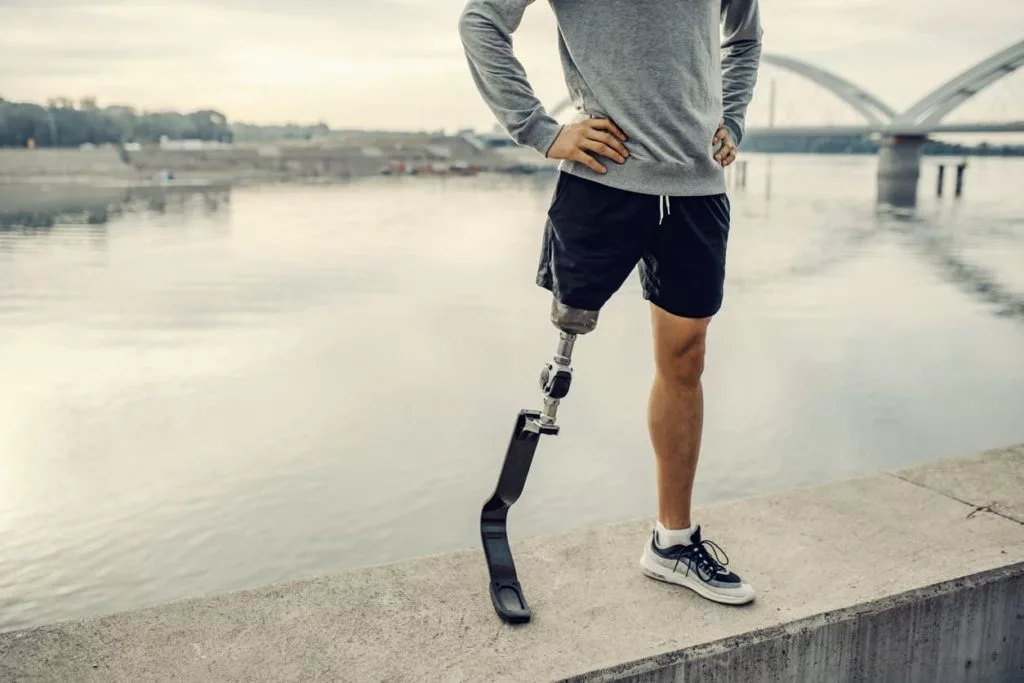
What is a Traumatic Amputation?
A traumatic amputation is defined as the loss of a body part because of an accident or personal injury. A traumatic amputation can involve any body part such as your arms, legs, feet, fingers, toes, ears, or nose.
Amputations are either complete or incomplete (partial). When a complete amputation occurs, there are no tissues, ligaments, nerves, muscles, or other anatomical structures connecting the amputated body part to the body. A partial amputation is when certain anatomical structures remain and connect the body part to the body, such as soft tissue, a tendon, or a muscle.
Sometimes, with both complete and partial amputations, the body part may be reattached surgically. Often, the body part has been too damaged to reattach, or reattachment leads to serious complications such as an infection.
If you have lost a body part because of a car crash or other serious accident, call us 24/7 at 706-354-4000 and speak to an attorney. If it’s after hours or on a weekend or holiday, hit the prompt to speak to a live person and tell the receptionist you have lost a body part because of an accident and would like to speak to an attorney immediately. They will patch you through to one of our skilled personal injury lawyers.
What is a Surgical Amputation?
Surgical amputation may be necessary if blood supply to a limb or body part is lost. The cells within the tissues of the limb will die. Once the tissue dies, it cannot be repaired or reconstructed. In these types of situations, amputation may be the only option. Surgical amputations are often the result of a doctor, surgeon, or other healthcare worker making a surgical error, failing to treat an infection, or failing to diagnose an infection. Surgical amputations may be caused by someone else’s negligence resulting in the body part being so damaged that it must be amputated.

MALPRACTICE ATTORNEYS IN GEORGIA
- What is Medical Malpractice Under Georgia Law?
- Is There Anything Else I Need to Prove?
- How Can I Prove a Medical Malpractice Claim?
- What are Some Common Examples of Medical Malpractice?
- Will a Medical Malpractice Case Take a Long Time?
- Can an Athens, GA Medical Malpractice Lawyer Help?
- Schedule a Consultation with Athens, GA Medical Malpractice Attorneys
Related Post
Complications of Amputations
Amputations are serious medical emergencies with certain risks involved. When someone loses a limb due to trauma-related or surgical amputation, complications can occur. Some of the risks include, but are not limited to:
- Severe blood loss
- Cardiac problems such as a heart attack or heart failure
- Strokes
- Wound infection
- Blood clots
- Pneumonia and other lung issues
- Phantom limb pain (the victim senses pain where the limb used to be attached)
- Psychological and emotional trauma such as depression and PTSD
Complications from amputations such as blood loss, shock, and infection are common. The long-term outcome for an amputee varies due to multiple factors such as emergency response, underlying conditions, surgery outcomes, and prosthesis fitting.
Common Injuries that Lead to Amputation
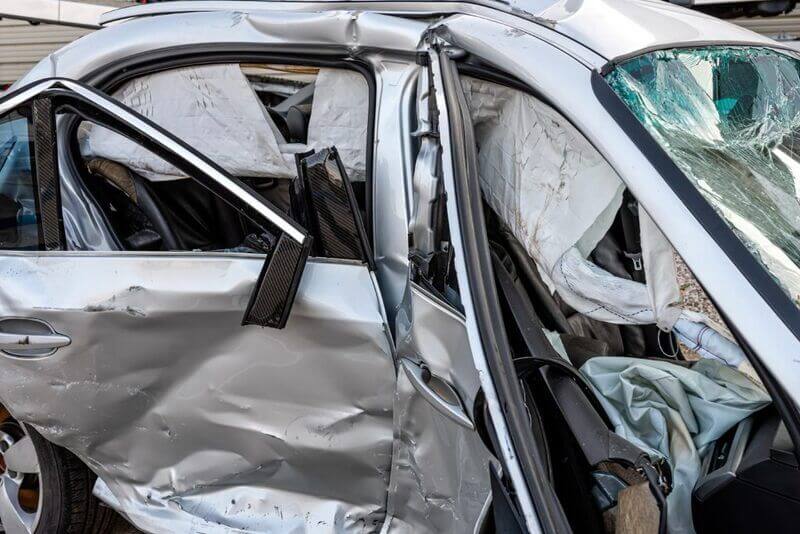


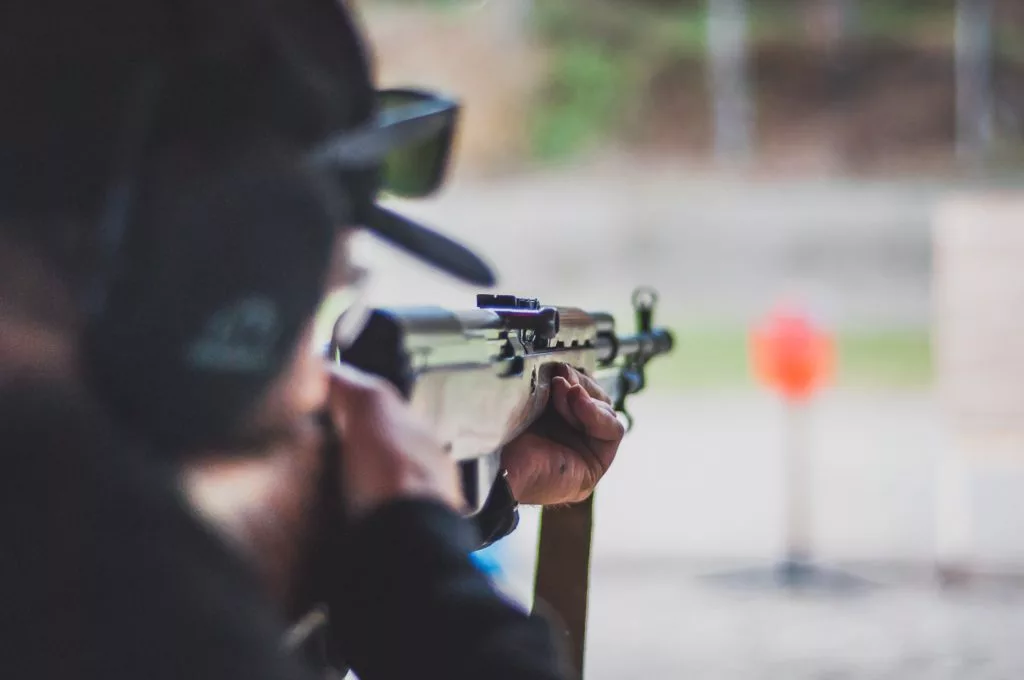

Some of the most common injuries that lead to amputation include, but are not limited to:
- Traffic accidents including cars, semi-trucks, motorcycles, bicycles, and trains.
- Workplace injuries including construction sites and factories.
- Agricultural accidents such as entanglement in moving machinery or lawnmower accidents.
- Firearm or explosive accidents including fireworks.
- Electrocution
- Medical Malpractice
- Nursing home neglect and abuse
- Pedestrian accidents
Traumatic Amputation Injury Statistics
At least 30,000 traumatic amputations occur in the U.S. each year and about two million people live in the U.S. with limb loss, according to Industrial Safety & Hygiene News (ISHN). The most common cause of traumatic amputations is motor vehicle accidents, with industrial and agricultural accidents ranking as the number two and three leading causes.
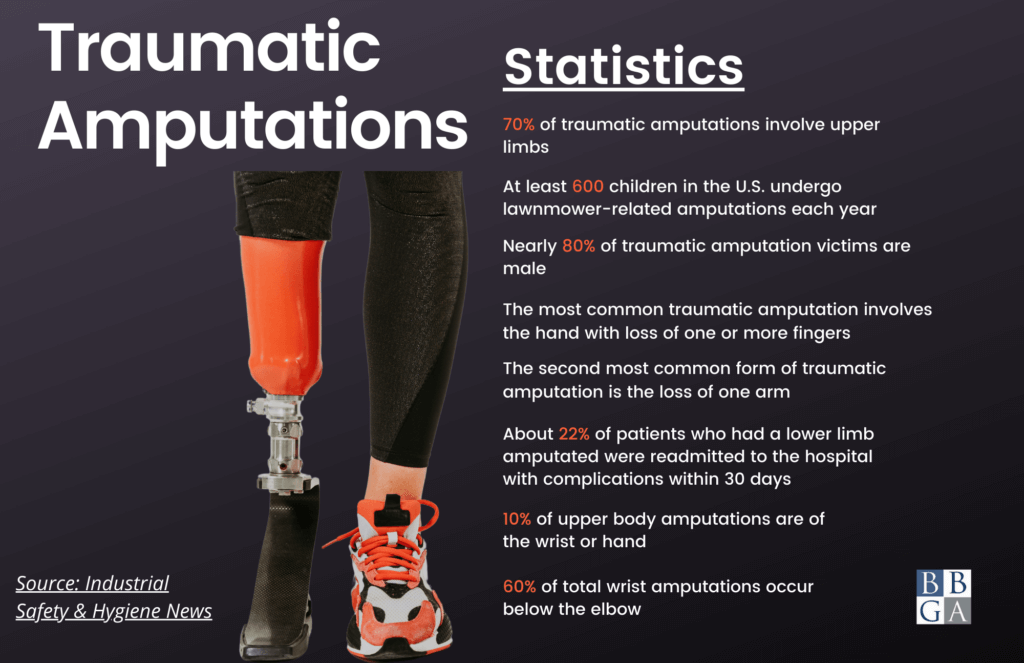
Traffic Crashes
Traffic accidents are the most common cause of traumatic amputations. When drivers fail to use due diligence when driving, it can lead to devastating consequences for everyone involved. Speeding, improper lane changes, impaired driving, and distracted driving may lead to a crash that leaves victims severely injured or in need of an amputation.
Because of the size and weight of semi-trucks and other commercial vehicles, these types of crashes can have devastating consequences for victims such as injuries that require amputation. When negligent practices lead to a crash, trucking companies should be held accountable.
Workplace Accidents
Amputations are some of the most extreme and debilitating workplace injuries. According to The Occupational Safety and Health Administration (OSHA), amputations mostly occur when workers operate unguarded or inadequately safeguarded mechanical equipment. This may include, but is not limited to:
- Power presses
- Conveyor belts
- Food slicers
- Meat grinders
- Drill presses
- Milling machines
- Circular saws
- Shearing machines
OSHA has standards in place to protect employees from injuries, including, but not limited to, requiring companies to safeguard machines with guards that provide physical barriers to prevent access to hazardous areas. Devices also help prevent contact points of operation and can interrupt the cycle of the machine when the operator’s hands are at the point of operation. Companies and organizations that use mechanical or other heavy equipment are responsible for safeguarding machines, properly training employees and other staff, and keeping employees safe from injury. Learn more here.
Medical Malpractice Amputation
When a doctor, surgeon, or other medical professional uses negligent practices and it leads to an amputation, victims are entitled to fight for full and fair compensation. Some examples of surgical amputation may include, but are not limited to:
- Surgical errors such as operating on the wrong limb or damaging a limb.
- Improper casting that leads to a damaged limb.
- Improper treatment that leads to an infection and eventually amputation.
- Failure to diagnose an infection that leads to an amputation.
- Non-sterile practices that lead to an infection and eventual amputation.
- Any breach of the standard of care required by law that leads to a necessary amputation.
Nursing Home Abuse or Neglect Resulting in Amputation
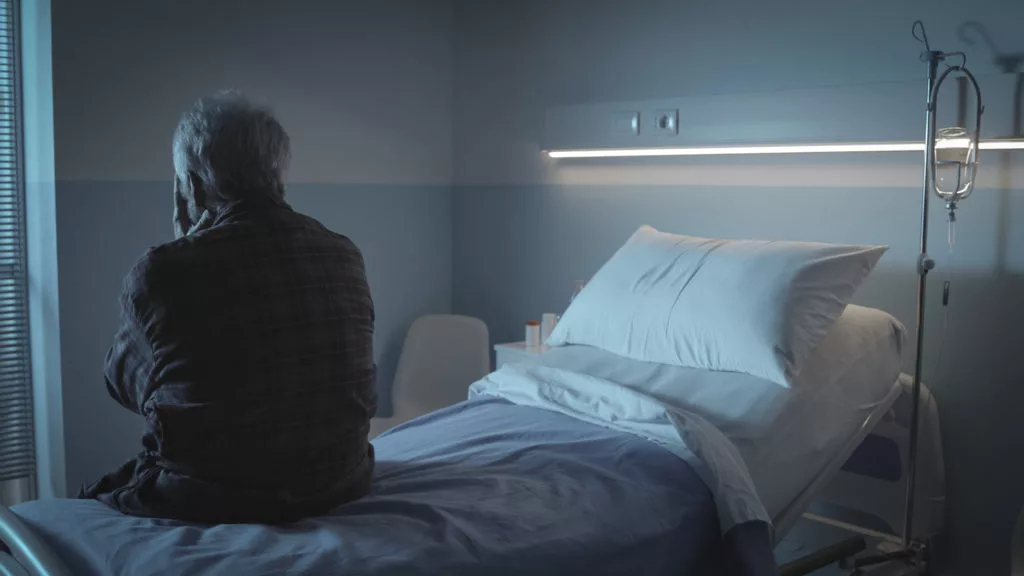
When someone places a loved one in a nursing home or other long-term care facility, they trust that the nursing home and its staff will provide the care that their family member needs and deserves. Unfortunately, sometimes negligent practices or abuse from the doctors, nurses, and other ancillary staff members at nursing home facilities leads to severe injuries like an amputation. Some examples of injuries or negligent practices that may lead to amputation include, but are not limited to:
- Falls and fall-related injuries.
- Bedsores
- Lack of supervision
- Dropping a resident
- Malnutrition that leads to infections.
- Medication errors that lead to injuries and/or infections.
- Improper treatment that leads to an infection and eventually amputation.
- Failure to diagnose an infection that leads to an amputation.
- Unclean practices that lead to an infection and eventual amputation.
- Physical abuse that leads to bone fractures, lacerations, and infections.
- Any breach of the standard of care required by law that leads to a necessary amputation.
Recovering from an Amputation
Recovery from an amputation can take months or sometimes years, depending on what body part is amputated, how severe the injury is, and whether other complications arise. Physical rehabilitation is an important part of recovery for an amputee, which can be a long and difficult process. Rehab may include exercises, transfer techniques to help you move around more easily, learning how to use a wheelchair if you lost a leg, and how to use a prosthetic limb if you are fitted with one.
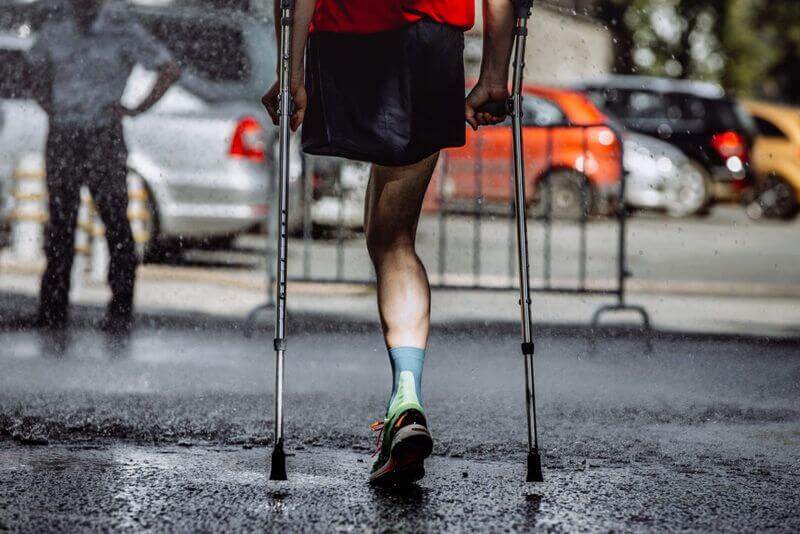
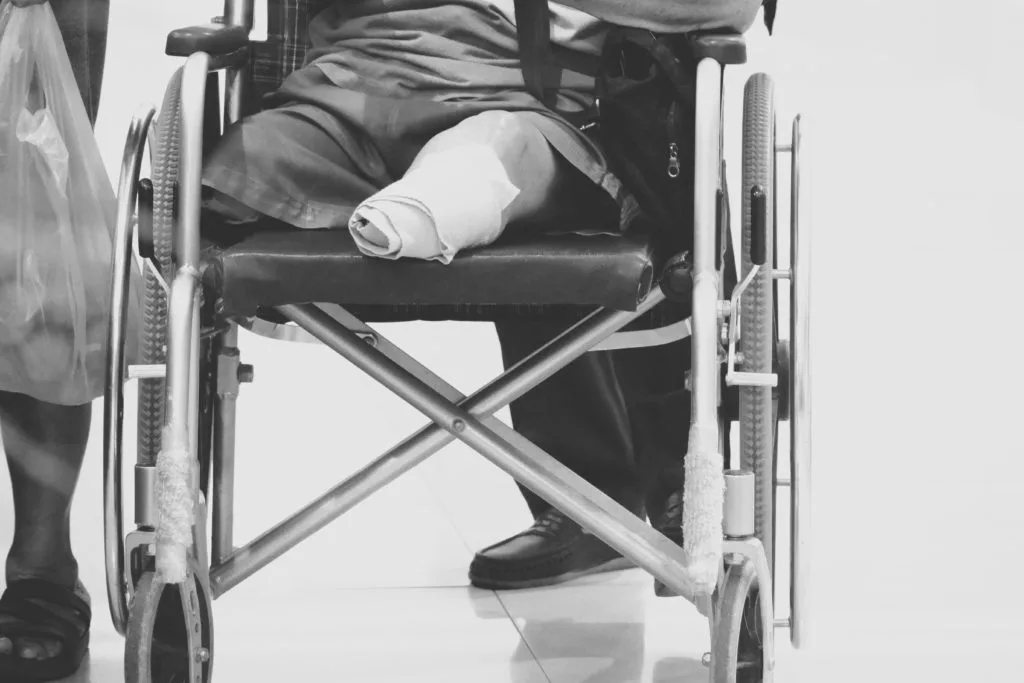
After an amputation you may need expensive assistive devices, or your home may require costly modifications like:
- Wheelchair ramps
- Stairlifts
- Walking aids
- A wheelchair
- A scooter
- Extra railings
- Extended doorways
- Special cabinet hinges that allow cabinets to open 180 degrees.
- A shower chair or bench
- Reaching tools
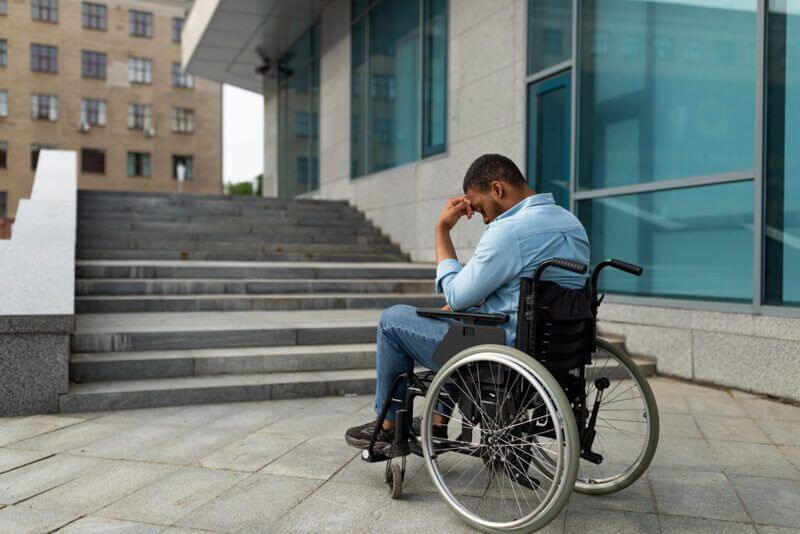
Recovering Compensation After an Amputation
Victims who require an amputation have experienced a life-changing event. Victims may be able to recover compensation to help pay for medical bills, required home modifications, prosthetics, ongoing medical treatment, lost wages, and pain & suffering. If the amputation occurred because a medical facility, company, or organization failed to adhere to safety standards, or because of a vehicle or truck crash that was not your fault, you have the right to fight for compensation for your damages.
Our attorneys have the resources to work closely with a life care planner and experts in orthotics, prosthetics, and economics to establish a life care plan that can be used in expert witness preparation and cross-examination. Certified life care planners create documents based on comprehensive assessments, data analysis, and extensive research for people who need medical care for the rest of their lives because of a catastrophic injury like an amputation. The documents help provide insight into an individual’s current and future medical, psychological, and rehabilitation needs.
The BBGA Difference

The personal injury attorneys at Blasingame, Burch, Garrard & Ashley, P.C. have a proven track record of securing the results amputation victims deserve. If you were injured because of someone else’s negligence and it resulted in an amputation, we will review the circumstances of the incident and determine whether you have a valid case.
We can work closely with medical professionals, accident reconstruction experts, witnesses, and other professionals to establish the cause of the injury and prove damages. We can also investigate the company’s, hospital’s, or other organization’s history of policies and procedures, as well as documents about the people involved, and determine whether negligent practices were a factor in your amputation injury. If negligence is found, we will protect your interests by pursuing a case against the parties involved, and if necessary, by representing you at trial.
Please call our office at 706-354-4000 to schedule a free consultation or fill out our contact form to tell us more about your potential case. There is no cost unless we recover money for you in your case.
A History of Results
We have an established track record of bringing our clients results they expect and deserve. We have recovered millions of dollars for our clients, and we know how to fight the insurance companies and medical facilities.
